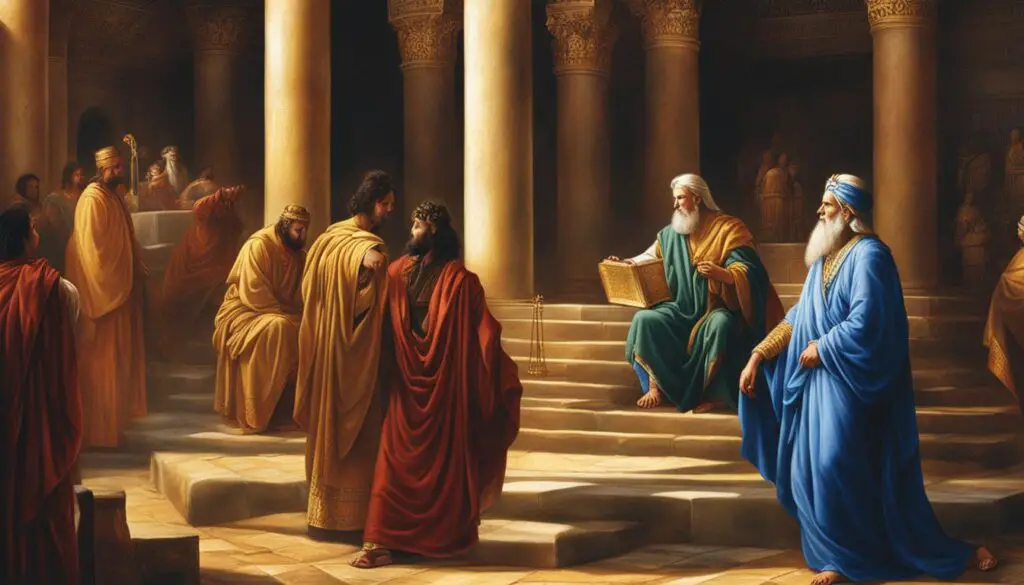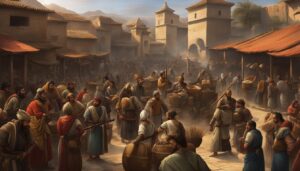
The ancient legal systems practiced in the Near East, particularly in ancient Israel as depicted in the Old Testament, played a significant role in shaping biblical narratives. The Old Testament presents various laws given to Moses by Yahweh, comprising civil, ceremonial, and moral laws. These laws expressed a high regard for life and included prohibitions on practices such as eating/drinking blood and consuming human flesh. Civil laws focused on justice and human rights, while ceremonial laws included rituals like sacrifices and circumcision. The Israelites were expected to observe the law and adhere to its stipulations, which were seen as binding in their journey of faith. The OT law traditions also showcased similarities with the laws practiced by pagan nations and kings in the ancient Near East.
Key Takeaways:
- Ancient legal systems shaped biblical narratives in the Old Testament.
- Old Testament law included civil, ceremonial, and moral laws.
- Civil laws upheld justice and human rights.
- Ceremonial laws involved rituals such as sacrifices and circumcision.
- Observing the law was integral to the Israelites’ journey of faith.
From the Law of Moses to the Law of Christ
The law of Moses holds a significant place in understanding the relationship between the law of Moses and the law of Christ. Contrary to misconceptions, the law of Moses was never separate from or lower than the gospel of Christ. Instead, it served as a foundation for comprehending the principles of the gospel and paved the way for the coming of the Messiah. By examining the law of Moses, we can gain valuable insights into the true meaning of the gospel message.
The law of Moses encompassed not only moral and ethical principles but also the law of carnal commandments. These commandments emphasized the importance of self-control and self-discipline. They served as a preparation for the higher law of Christ, which required faith in Jesus Christ, repentance, and baptism. Therefore, rather than dismissing the law of Moses as outdated or irrelevant, we should recognize its significance in establishing a framework for comprehending the law of Christ.
“The law of Moses was never a system separate from the gospel. It was a part of that gospel, a stepping-stone to the higher law of Christ, a preparatory gospel to bring men to Christ.”
Understanding the purpose and power of the law of Moses is essential in reconciling its role with the law of Christ. By recognizing the interconnectedness of these laws, we can grasp the profound teachings and principles that guide us in our journey of faith.
The Law of Moses and the Law of Christ: A Comparative Overview

| Aspect | Law of Moses | Law of Christ |
|---|---|---|
| Foundation | Provided a framework for understanding the principles of the gospel | Emphasizes faith in Jesus Christ, repentance, and baptism |
| Scope | Encompassed moral, ethical, and carnal commandments | Focuses on higher spiritual laws and principles |
| Preparation | Served as a preparatory gospel to bring men to Christ | Leads to salvation through the Atonement of Jesus Christ |
| Importance | Established the groundwork for comprehending the law of Christ | Guides individuals in their journey of faith and salvation |
By examining the comparative aspects of the law of Moses and the law of Christ, we can gain a deeper understanding of their interconnectedness and the divine purpose they serve in shaping our spiritual growth and development.
The Law as a Reflection of God’s Character
In the Bible, God’s law is depicted as a mirror reflecting His character. Just as a mirror reveals our physical appearance, the law reveals our spiritual condition. It shows us where we fall short of thinking and acting like God, exposing our sins and weaknesses. However, the law alone cannot cleanse or save us; it is through God’s forgiveness and the sacrifice of Jesus Christ that our sins are wiped away.
Despite its inability to save, the law plays a vital role in defining what is clean and setting a standard for godly living. The characteristics used to describe the law in the Bible are also used to describe God Himself. By internalizing and keeping God’s law, we strive to align our lives with His character of love and righteousness. In this way, we walk in obedience to Him and become more like Him each day.
Living in accordance with God’s law does not mean simply following a set of rules, but it encompasses a deeper transformation of our hearts and minds. As we seek to mirror God’s character, His law becomes a guide that shapes our thoughts, attitudes, and actions. It becomes a compass that directs us towards a life of love, justice, and compassion.
In conclusion, while the law cannot save us, it serves as a reflection of God’s character and a guide for godly living. By embracing the law and allowing it to shape us, we align ourselves more closely with God’s love and righteousness. Let us continually strive to live like God, reflecting His character in all that we do.
FAQ
How did the ancient legal systems practiced in the Near East shape biblical narratives?
The ancient legal systems practiced in the Near East, particularly in ancient Israel as depicted in the Old Testament, played a significant role in shaping biblical narratives. The Old Testament presents various laws given to Moses by Yahweh, comprising civil, ceremonial, and moral laws.
What were the different types of laws mentioned in the Old Testament?
The laws mentioned in the Old Testament can be categorized into civil, ceremonial, and moral laws. Civil laws focused on justice and human rights, while ceremonial laws included rituals like sacrifices and circumcision. Moral laws expressed a high regard for life and included prohibitions on practices such as eating/drinking blood and consuming human flesh.
How were the Israelites expected to observe the law?
The Israelites were expected to observe the law and adhere to its stipulations, which were seen as binding in their journey of faith.
Did the ancient Near East laws have any similarities with the laws practiced by pagan nations and kings?
Yes, the Old Testament law traditions showcased similarities with the laws practiced by pagan nations and kings in the ancient Near East.
What is the relationship between the law of Moses and the law of Christ?
The law of Moses was never separate from or lower than the gospel of Christ. It served as a foundation for understanding the principles of the gospel and included elements such as faith in Jesus Christ, repentance, and baptism.
What role did the law of Moses play in paving the way for the coming of the Messiah?
The law of Moses, along with the preparatory gospel, played a crucial role in paving the way for the coming of the Messiah.
How is the law of Moses related to self-control and self-discipline?
The law of Moses encompassed the law of carnal commandments, which focused on self-control and self-discipline.
What is the purpose of God’s law according to the Bible?
The Bible portrays God’s law as a reflection of His character. The law sets a standard for godly living and defines what is clean. It serves as a mirror that reveals our sins and areas where we fall short of thinking and acting like God.
Can the law cleanse or save us?
No, the law cannot cleanse or save us. Only through the forgiveness of God and the sacrifice of Jesus Christ can our sins be wiped away.
How can we grow in godliness and align our lives with God’s character?
By internalizing and keeping God’s law, we become more like Him each day. The law is not to be discarded or deemed irrelevant but embraced as a means to grow in godliness and align our lives with God’s character of love and righteousness.








